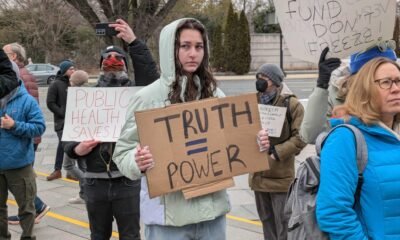arizona
Solar Power Boom at Risk in AZ: Trump’s Pledge to End Biden-era Incentives Could Stall Growth

WASHINGTON – The Sun Stream Complex in western Maricopa County, a $2 billion solar project, is set to provide power for over 200,000 homes. This expansive solar farm spans more than 6,000 acres and has been operational for over three years.
By 2026, it is projected to generate 973 megawatts of emission-free electricity and contribute approximately $300 million in lease payments and taxes to Arizona’s schools and communities, according to Longroad Energy, the Boston-based company behind the initiative.
Longroad CEO Paul Gaynor highlighted the positive impact of the Inflation Reduction Act (IRA) during the April ribbon-cutting ceremony. He stated, “$2 billion of investment, components made in America, competitive carbon-free electricity, and significant job creation. It’s a great story.” However, this success could be jeopardized if President-elect Donald Trump follows through on his promise to repeal the IRA, which supports such renewable initiatives.
The IRA, enacted in 2022, allocates tax credits estimated at $370 billion aimed at accelerating the transition to renewable energy sources and reducing greenhouse gas emissions. Goldman Sachs projects these incentives could be valued at nearly $1.2 trillion by 2032.
Trump has publicly criticized the IRA, labeling it part of what he calls the “Green New Scam.” He has stated intentions to rescind unspent funds and dismantle renewable energy policy, although repealing the IRA would require congressional approval. Many Republican lawmakers recognize the benefits certain states gain from these incentives and may oppose Trump’s plans.
Longroad has not disclosed how much funding from the IRA was critical to the Sun Stream project but has expressed concern over potential funding cuts under Trump’s administration. This solar complex, located about 40 miles from Phoenix, is estimated to offset around 1.3 million metric tons of carbon emissions.
In partnership with Phoenix-based First Solar, the largest U.S. solar panel manufacturer, Longroad is positioned at the forefront of the renewable energy sector. Despite the dominance of Chinese manufacturers in the global solar panel market, accounting for 80% of sales, U.S. tariffs on Chinese imports have aimed to mitigate unfair trade practices.
In May, the Biden administration announced it would double tariffs on Chinese solar panels, raising them from 25% to 50%. At the ribbon-cutting, Arizona Governor Katie Hobbs emphasized the complex as a testament to effective land management and the benefits of renewable energy for residents.
Solar installation costs have dropped more than 40% since 2010, driving a remarkable growth rate of 25% annually, as reported by the Solar Energy Industries Association (SEIA). Currently, solar energy accounts for about 11% of Arizona’s electricity.
With projections indicating that Arizona could add 12 gigawatts of solar capacity in the next five years, sufficient to power 1.4 million homes, the state ranks fifth in total solar capacity nationwide.
Research from the Net Zero Industrial Policy Lab at Johns Hopkins University indicates that repealing the IRA could severely impact U.S. manufacturing, resulting in job losses and a potential export reduction of up to $50 billion.
Autumn Johnson, Arizona’s SEIA executive director, stressed the importance of the IRA for maintaining domestic manufacturing and investment in renewable energy technologies. “Without these incentives, there is little motivation for companies to return their manufacturing to the United States,” she asserted.
As the political landscape shifts, with Republicans set to control Congress starting January 3, the future of the IRA remains uncertain, despite various factions within the party expressing support for the current climate policy. Recent communications from House Republicans, including Rep. Juan Ciscomani of Tucson, strongly urged against an immediate repeal of the IRA, citing fears of disruption to ongoing energy projects.
Meanwhile, in response to international trade issues, Trump has proposed significant tariffs on imports from Canada, Mexico, and China. Solar industry insiders warn that overarching tariffs could inflate costs for essential components and hinder growth in the sector. Nearly 90% of imported solar panels currently originate from Southeast Asian nations, as manufacturers seek to circumvent U.S. tariffs.
On November 29, U.S. trade officials revealed plans for tariffs as high as 271% on solar panels from Chinese firms established in those regions, a move prompted by complaints from U.S. companies, including First Solar.
Industry experts caution that repealing the IRA could counteract these protective tariffs, undermining efforts to bolster domestic production. Building a robust manufacturing ecosystem, they argue, requires sustained incentives and time, elements that could be jeopardized by political changes.


















